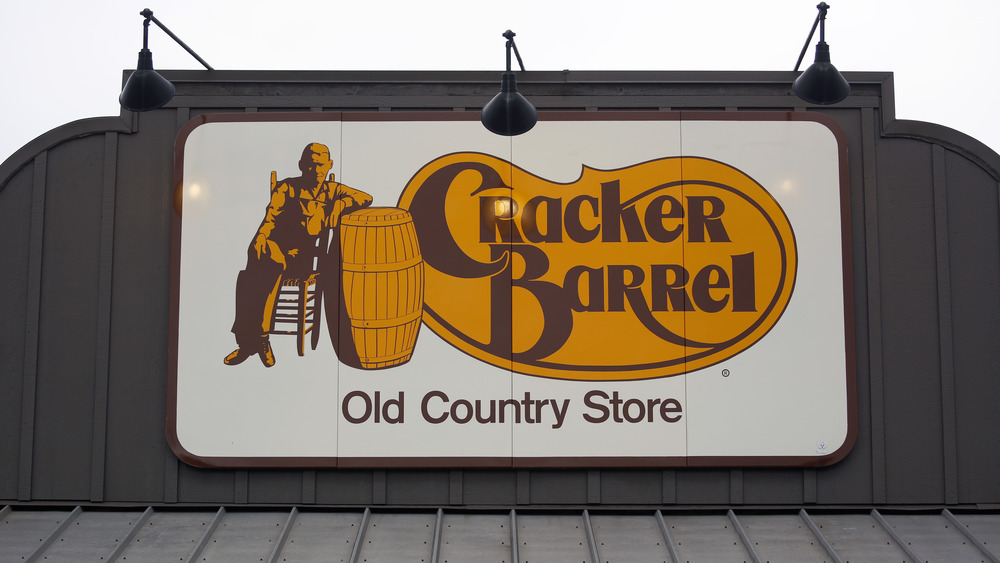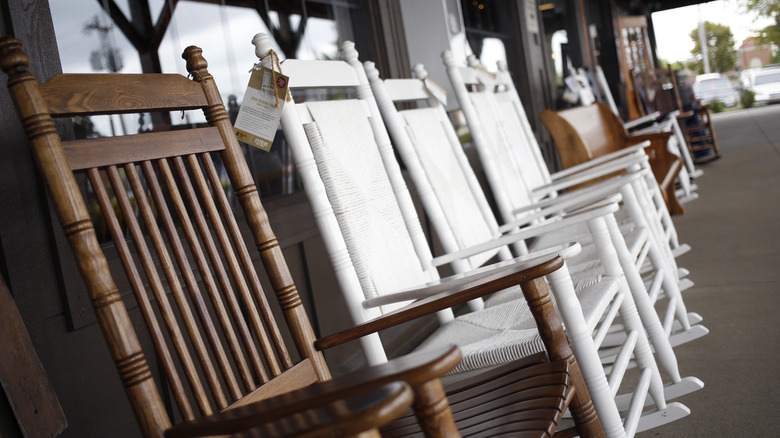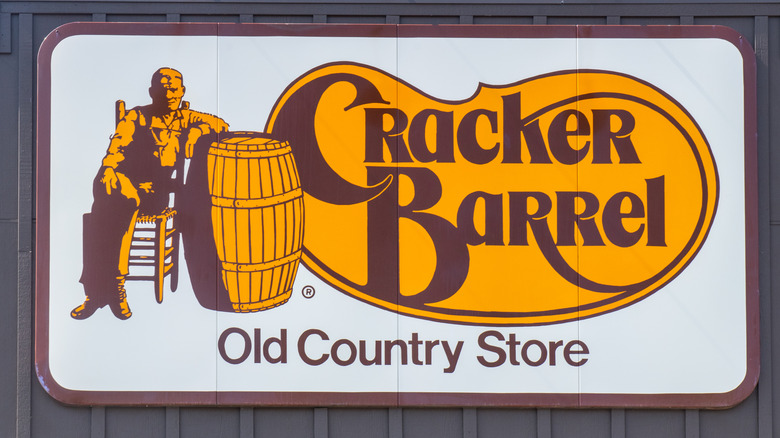The Real Reason People Are Calling Out The Cracker Barrel Logo
It's hard not to have an opinion about Cracker Barrel Old Country Store, the gift shop and comfort food restaurant chain found along interstate highways across the United States.
Even if you've never eaten there, you may have heard "Cracker Barrel" used as shorthand for the rural white demographic in America. For example, a political blogger noted in 2011 that during the 2008 election, Barack Obama only won 36% of counties that have a Cracker Barrel, per The Washington Post. And while the Tennessee-based restaurant chain tries to promote a wholesome image of Southern hospitality, it has been hit with at least two lawsuits accusing it of racism: one from customers, per the Associated Press, and one from employees, per the U.S. Equal Employment Opportunity Commission.
Suspicions that Cracker Barrel is racist persist. In 2020, a Cracker Barrel restaurant in Connecticut apologized after a customer saw what looked like a noose hanging from the establishment's heavily decorated ceiling. The noose turned out to be a cord from an antique soldering iron, according to the local newspaper the Journal Inquirer. Local activists, however, were still alarmed. "Combined with the plantation-style decor of the place, it is a very clear sign that they want a whites-only atmosphere," Joanna Iovino told the newspaper.
Cracker Barrel was named after barrels of crackers in country stores
A 2021 tweet interpreting Cracker Barrel's logo as racist garnered a lot of traction. @DomoDaDonn tweeted a photo of the restaurant chain's logo, which shows a white man sitting by a barrel, next to the words "Cracker Barrel." A long, sweeping line connects one of the "R's" in "barrel" to the "K" in "cracker." Whoever originally created the tweeted photo added text saying the curved line resembled a whip. They claimed that "cracker" is slang for "whip" and whips were sold out of barrels in country stores. Hence the name: Cracker Barrel.
Most of that is false. The slang term "cracker" only partially originates from white people who used whips on livestock and even slaves, per NPR. But those country-store barrels in fact held crackers, not whips, according to the obituary for Cracker Barrel founder Dan Evins published in The Washington Post in 2012.
Twitter user @GodotisW8ing4U tried to set the record straight on the social media platform. Godot laughed off the whip symbolism: "You don't know what a whip looks like, AND you're insane if you think keeping whips in a barrel would ever make any sense (they'd all get tangled)." Even so, a lot of Black Twitter expressed no fondness for Cracker Barrel restaurants. @Whoisnovember tweeted, "I still can't see how some of y'all have actually gone into and EATEN at this place! Y'all BRAVE I've never stepped foot!"
Cracker Barrel addressed the rumors
The media relations team at Cracker Barrel has refuted the rumors around the supposed symbolism of the brand's logo. The company's representatives provided a statement to Heavy, explaining, "The logo of Cracker Barrel Old Country Store does not depict and has never depicted a whip. The part of the logo being referenced in social media posts is a flourish, which is used in the calligraphy of the logos of many brands."
The official statement continues with, "Cracker Barrel rejects racism and discrimination in any form. When associations are made between our company and these ideas, it is deeply upsetting because it contrasts so sharply with our values and our team's work to create a culture of hospitality that's welcoming, respectful and inclusive to everyone who walks through our doors."
Cracker Barrel has also shared its Diversity & Inclusion mission page on its website, stating that employees and restaurant guests are treated with respect and fairness. The page reads, "Discrimination, either overt or through unconscious bias, has no place at Cracker Barrel Old Country Store." Cracker Barrel's corporate leadership team has taken steps to ensure diversity and transparency are at the forefront of the brand. And as far as the logo goes, this myth has been strongly debunked.


